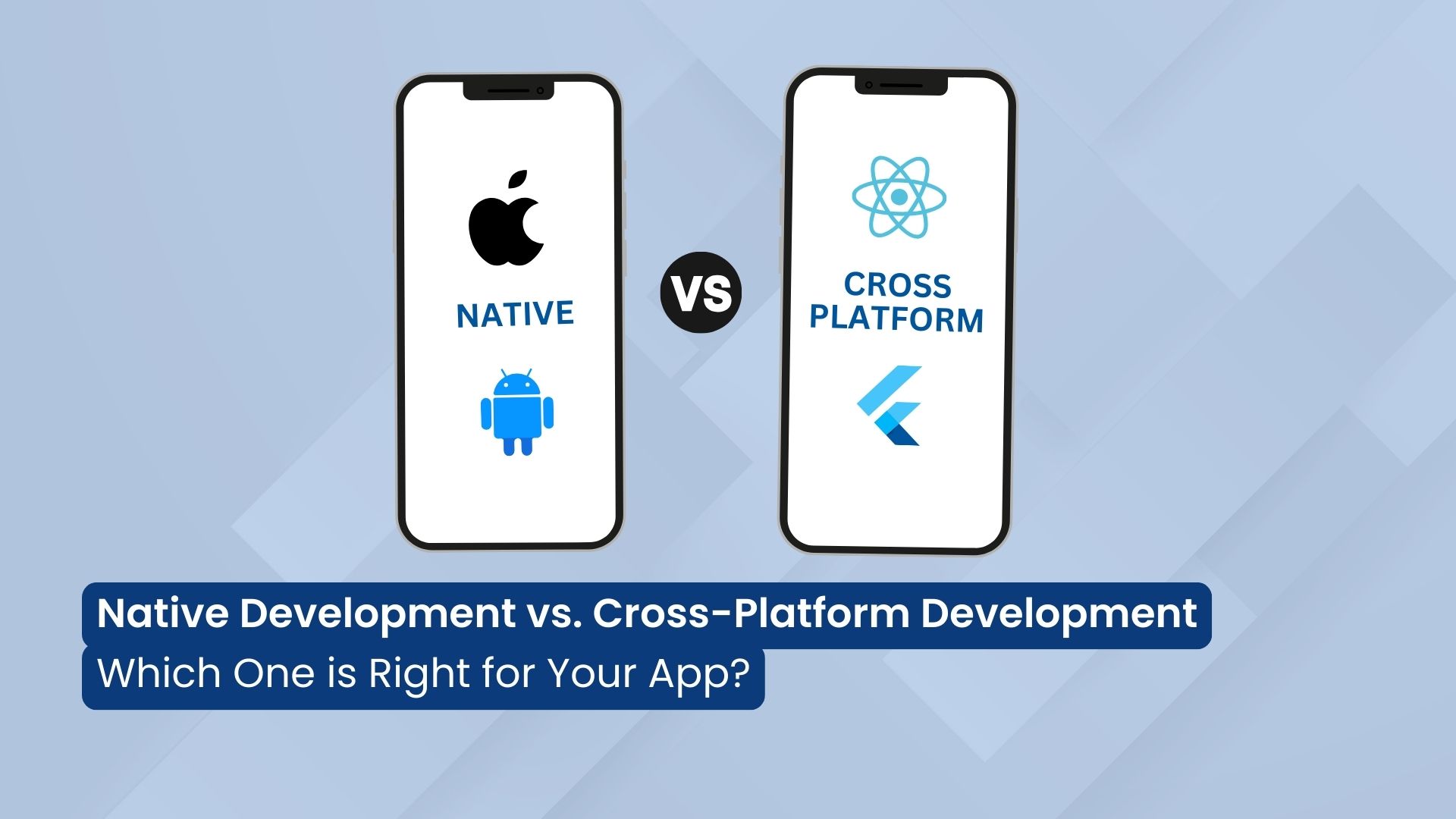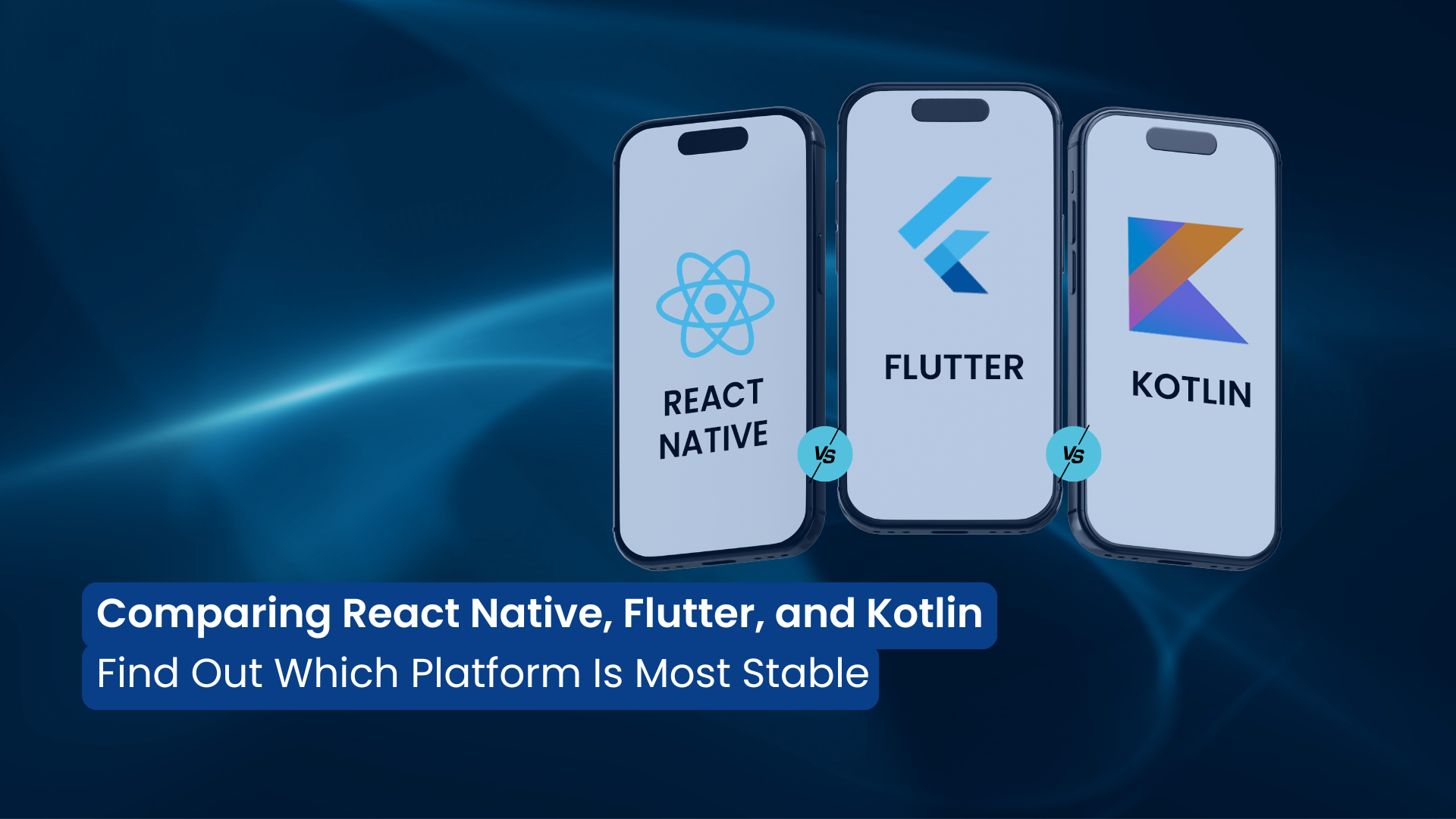Streamline Your Data Processes - Start a project!
Get customized solutions for your business - Try Our Services Today!
Streamline Your eCommerce Operations - Try Our Services Today!

Native Development vs. Cross-Platform Development: Which One is Right for Your App?
Before mobile app development, organisations must decide - Whether they Should pursue native development or cross-platform solutions.
The choice between native development and cross-platform solutions represents a fundamental decision which determines the project timeline along with costs, user experience standards and the success of the digital products in the market. Statista data shows that mobile app revenue has exceeded $935 billion in 2023 which demonstrates the crucial need for proper selection of app development strategies. The growing number of apps in the Google Play Store (3.48 million) and Apple App Store (2.22 million) has reduced the available space for errors in mobile application development.
This blog investigates the native development approach vs cross-platform development to offer necessary information for your decisions on the development of your mobile application.
Let’s Understand Native App Development
When developers create applications for a single platform they use native development which requires the platform-specific language and tools. Developing iOS platforms requires Swift or Objective-C integrated with Xcode while Android applications need Java & Kotlin with Android Studio.
Advantages of Native Development
1. Superior Performance and Speed
Native apps achieve their highest operational speed because they are built exclusively for their target platform. Native applications surpass hybrid implementations by 10 to 30 percent when it comes to launch performance and overall system responsiveness.
2. Enhanced User Experience
Native app development provides developers with UI components that match operating system guidelines directly. Users benefit from an intuitive experience because the platform navigation patterns seamlessly integrate with the interface elements they already know.
3. Full Access to Device Features
Native development provides unrestricted access to device capabilities like camera, GPS, microphone, and other hardware features. Developers can use this unrestricted access to build advanced applications with rich features because they do not need to concern themselves with compatibility problems or performance issues.
4. Better Security and Stability
Native apps typically provide better security structures than cross-platform equivalents, according to Positive Technologies' 2022 Mobile Security Report. With platform-specific security features and official support from Apple and Google, native apps provide robust protection against common vulnerabilities.
Limitations of Native Development
1. Higher Development Costs
Developer usually takes lot of time to write different codebases for each platform. The duplication of work in development creates a large amount of expenses and maintenance costs that accumulate over time.
2. Longer Time-to-Market
The necessity to handle multiple codebases lengthens the process of development. Research indicates cross-platform typically takes 30-50% lesser time to bring an app to market compared to native app development.
3. Specialized Team Requirements
Native development often requires specialized developers for each platform, increasing human resource costs and management complexity.
Let’s Understand Cross-Platform Development
Cross-platform development involves using frameworks that allow developers to write code once and deploy it across multiple platforms. Popular cross-platform development solutions consist of React Native, Flutter, Xamarin and Ionic.
Advantages of Cross-Platform Development
1. Cost-Effectiveness
The ability to develop software once and execute it everywhere cuts down development expenses. The article by “Engineerbabu” shows businesses can reduce their project development costs by 40% by using cross-platform solutions instead of native development.
2. Faster Development Cycle
With a single codebase serving multiple platforms, cross-platform development can accelerate your time-to-market substantially. Stack Overflow conducted a survey which revealed 68% of developers experienced shorter development times using cross-platform frameworks instead of working with native frameworks.
3. Wider Market Reach
Cross-platform development allows businesses to simultaneously target iOS and Android users, growing approximately 6.1% of the global smartphone market according to IDC's 2024 mobile OS market share data.
4. Easier Maintenance
Managing a single codebase simplifies the update process, bug fixes, and ongoing maintenance. The changes made to the codebase directly applies to every platform through a single deployment process and reduce platform-specific inconsistencies.
Limitations of Cross-Platform Development
1. Performance Considerations
Despite significant improvements in recent years, cross-platform apps may still experience performance limitations compared to native applications, particularly for graphics-intensive applications or complex functionalities.
2. Limited Access to Native Features
Modern cross-platform frameworks have reduced this limitation by providing improved access to platform features although developers sometimes need to create custom bridges or wait for framework updates to utilize fresh platform capabilities.
3. Framework Dependence
Your application's future development depends partly on the developmental direction of the framework along with community backing. Support for a framework ending or becoming out of date can trigger extensive rewriting of the application.
Making the Right Choice: Factors to Consider
1. App Complexity and Features
For simple apps: Cross-platform development often provides sufficient performance while reducing development costs and time.
For complex, feature-rich apps: Native development might be necessary to ensure optimal performance and full access to platform capabilities.
2. Budget Constraints
If working with limited financial resources, cross-platform development can offer significant cost advantages without necessarily compromising quality, particularly for straightforward applications.
3. Timeline Requirements
Cross-platform development can accelerate app launch timeline significantly. The deployment of cross-platform development speeds up product releases by 40% when developers build different native applications.
4. Performance Expectations
If your app requires maximum performance—such as games, AR/VR applications, or computation-heavy tools—native development typically offers superior results. However, frameworks like Flutter have created substantial progress toward closing this technological gap.
5. Long-term Maintenance Strategy
When planning for application maintenance, identify the future maintainers and evaluate their skill sets. Cross-platform codebases are generally easier to maintain with smaller teams, while native apps might require platform specialists.
The Hybrid Approach
Successful companies achieve balance through hybrid development approaches that combine cross-platform framework development for core functionality with native implementation for critical performance features. This method establishes an effective solution that achieves maximum development speed and delivers top-notch user interaction. React Native has become crucial for these companies since they use it for their main user interfaces yet maintain critical native functions for optimal performance. The reported case study from Instagram demonstrates that their hybrid approach resulted in 50% faster feature deployment speed without compromising performance quality.
Conclusion
The choice between native v/s cross-platform development ultimately depends on your specific business needs, technical requirements, and resource constraints. Here's a simplified decision framework:
| Choose native development if: | Choose cross-platform development if: |
|
|
The mobile app development landscape continues to evolve rapidly, with cross-platform frameworks becoming increasingly sophisticated while native tools grow more developer-friendly. Project success depends on understanding the essential differences between these two development approaches.
Finally, Ready to Build Your App?
At Syncrasy Technologies, we specialize in both native app development and cross-platform solutions, with expert teams ready to guide you through this critical decision process. Our team of developers will transform your ideas into successful applications through native solutions or cost-efficient cross-platform development.
Don't let technology choices become obstacles to your app's success. Contact our mobile app development experts today for a personalized consultation on the best approach for your unique needs. Let's build something exceptional together.
Categories
- Digital Asset Management (DAM)
- Artificial Intelligence (AI)
- Product Information Management (PIM)
- E-commerce
- Master Data Management (MDM)
- Digital Experience Management
- Customer Data Platform
- Data Management Platform
- Recruitment
- Covid-19
- Digital Workspace
- Digital Experience Portal (DXP)
- Omnichannel Experience
- Pimcore
- Framework Comparison
- Software Development
- Learning Management Solution (LMS)
- CRM System
- Sales Portal
- Salesforce
- Blockchain Development
- App Development
- Technology
Similar Blogs

Why Your Web App is Failing & How to Fix It (5 Common Mistakes)
Your business success depends greatly on the quality of your web application. Despite significant in...
Read More
Native Development vs. Cross-Platform Development: Which One is Right for Your App?
Before mobile app development, organisations must decide - Whether they Should pursue native develop...
Read More
Comparing React Native, Flutter, & Kotlin: Which One Wins in 2025?
Three frameworks are currently ruling in the mobile development sector - React Native, Flutter, and ...
Read More

